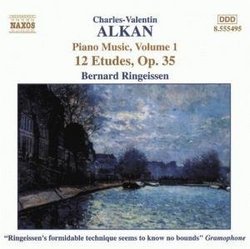Amen - great pieces
panicnow | 05/18/2006
(5 out of 5 stars)
"Tacky (the guy below me) said just about everything there is to say about this CD but I would like to add one other thing. As well as #7, etudes #10 and #11 are two of the greatest Romantic-era pieces I have ever heard. #10 will leave you stunned, I guarantee it. The ending might disappoint on first hearing, but once the meaning becomes clear, it is as powerful as any. Listen a second and a third time. #11 is the best possible answer to #10, an uplifting but never pretentious piece. Why more pianists don't play these two pieces consecutively in concert baffles me.
A lot of these etudes are great kind of in the same way that Mozart and Haydn are great (although the musical style is very different). Sometimes (the key word is sometimes) the music isn't necessarily the deepest thing you've ever heard, but its compositional prowess and genius and the sense of inspiration is so impressive that you can't help but appreciate the music. Same story here. 7, 10 and 11 stand out for emotional power and depth, but COMPOSITIONALLY just about all of these are masterpieces, in terms of never losing steam, always displaying a constant flow of musical innovation, etc. Far more inspired than most of Liszt's etudes in my opinion."
Alkan Joins the Pianistic Olympus
Hexameron | 04/25/2006
(5 out of 5 stars)
"Charles-Valentin Alkan is one of the 19th century's greatest composers for piano. Busoni placed him next to Beethoven, Chopin, Schumann and Liszt. Sorabji described Alkan's music as having Beethovenian quality with Berliozian aesthetics. On his deathbed, Chopin requested his unfinished and unpublished drafts to be given to Alkan. This is a composer who has been respected by the giants of pianism and yet completely relegated to obscurity by the music cognoscenti and the public. This Naxos reissue of a Marco Polo release is one of the top-five essential Alkan recordings, with Hamelin's discography for Hyperion at the top. You will be hard-pressed to find a better performance or a cheaper recording of the Op. 35 anywhere else.
Alkan's Op. 35 Etudes seems like a fusion between the technical aims and musical substance of Chopin's and Liszt's Etudes. Each of Alkan's Etudes possesses not only a wealth of melody, but a high degree of individual expression and a pure Alkanian technical signature. Without a doubt, Chopin's lyricism was Alkan's greatest influence in these Etudes; however, one can surely detect Liszt in the overflowing bravura and knuckle-busting virtuosity. Upon acknowledging the sheer pianistic feats and exceptional quality of music in these Etudes, I'm inclined to believe they supplant those of Hummel, Moscheles, Saint-Saens, and even Henselt.
Consider the third study in G major: it starts off as a lovely harmonically stable Andantino, until an intense rift of drama interrupts and brings forth an infernal torrent of passagework that makes Chopin's Op. 25 No. 11 sound like a mere "Breezy Wind." Then there is the fifth Etude, a jaw-dropping and savage "Allegro barbaro" (no relation to Bartok), utilizing only the white keys. Rhythmically and melodically this is the most satisfying virtuosic Etude of the set, one that reaches astonishing tone colors in the impossibly rapid last section. The next masterstroke that balances technical objective with poetic content is the lengthy seventh Etude, "Fire in the Neighboring Village." This is the first "programme" Etude I'm aware of, narrating and suggesting a story like a symphonic poem. Forget the programme, though, because this music doesn't need it. Rivaling the violence, turbulence and heroism of Chopin's "Revolutionary Etude," this work takes on monumental proportions. Its tranquil first section is tender enough, but the tormented central section gushes forth with Romantic grandeur, brutality and anger. If this outstanding piece isn't evidence enough of the amazing virtues of Alkan's Etudes, I would point to the ninth in C sharp major, the "Contrapunctus," a resplendent quasi-Busonian work of Romantic polyphonic texture and Lisztian timbres. It presages Medtner and Godowsky. While I've failed to mention every Etude in depth, they are all worth an equal amount of commentary. I might add one final remark on the powerfully expressive tenth, though, the "Chant d'amour - Chant de mort." Its arsenal includes Chopinesque beauty and Haydnesque surprise. This surprise is so important that Alkan attached a Latin quote to the Etude: "When you expect light, there comes darkness."
Although this recording is invaluable for the featured Op. 35 Etudes, Bernard Ringeissen has raised his status even higher with the precision and interpretative clairvoyance he exercises in the two Op. 39 Etudes, the great "Le Festin d'Esope" and "Scherzo diabolico." I've heard Jack Gibbons, Marc-Andre Hamelin and Ronald Smith perform the 25 variations of the Op. 39 No. 12, and I must say Ringeissen's execution is by far the most agreeable, demonstrating clarity and dynamics that are lacking in other performances. I find Hamelin's delivery too fast and histrionic; and although Gibbons's interpretation is excellent, there is an extra suavity, rhythmic sensitivity and insight into the melodic lines that only Ringeissen has. For beginners to Alkan, this is definitely one of the best places to start, and the work takes its place in the pantheon of virtuosic Theme and Variations. Lastly, I must say that Ringeissen's rendition of the Scherzo diabolico is another success. He obtains a duality of devilish finesse and muscular attack, making it the best version I've heard.
Bottom line: Whether you're completely new to Alkan (as I was when I first bought this CD) or absolutely familiar with these Etudes, this Naxos release is a treasure trove of 19th century piano music. Alkan's Op. 35 is a vast reservoir of electrically-charged, thrilling, and expressive music. The exceptional quality of this music has convinced me that it ranks in the same group of Etudes as Chopin's, Liszt's, Henselt's and Rachmaninov's."


 Track Listings (14) - Disc #1
Track Listings (14) - Disc #1